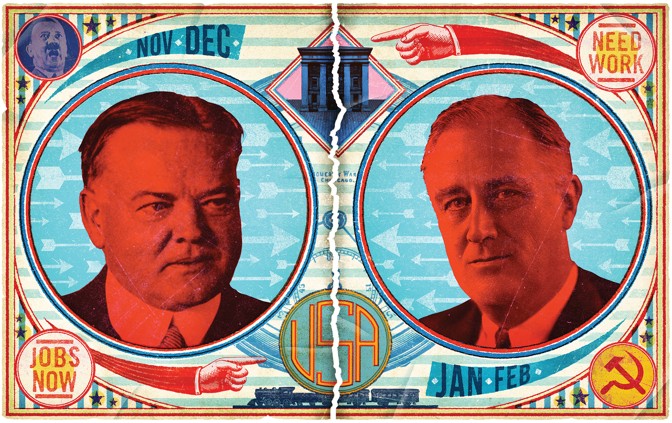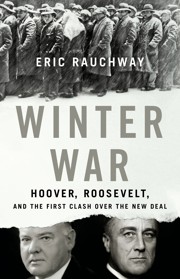FDR and Herbert Hoover’s Fight Over the New Deal - The Atlantic
Winter War: Hoover, Roosevelt, and the First Clash Over the New Deal
BY ERIC RAUCHWAY
CHRISTIAN NORTHEAST
In January 1933, President Herbert Hoover found himself in a position familiar at that point to millions of Americans: He was about to lose his job. Unsure of what the future might hold, he considered whether to accept an offer of a regular appearance on a weekly radio program sponsored by the Old Gold tobacco company. Hoover found the idea distasteful—becoming a speaker on a show whose ultimate purpose was to advertise cigarettes seemed to him a debasement of the presidency—but it was a desperate time. As he wrote to his press secretary, Theodore Joslin, “It is probably something I cannot do, but, well, I hate to say it, but I need that $150,000, Ted.”
Meanwhile, the financial structure of the United States was approaching collapse. At the start of Hoover’s presidency, 24,000 banks had been open for business throughout the country. By 1933, 10,000 of these had shut their doors. One state after another—Nevada, Iowa, California—was suspending normal bank operations in order to keep frightened depositors from withdrawing their cash. Publicly, Hoover insisted that the solution to the panic was a recommitment to the gold standard by nations that had recently abandoned it, such as Great Britain; he blamed the impending Roosevelt administration for sowing fear and discord. But privately, only a day before Michigan declared a bank holiday to protect its faltering financial system, he told Edgar Rickard, an old friend from Hoover’s days as a mining engineer and executive, to withdraw “$10,000 in bills” for emergencies.

The story of an angst-filled Hoover quietly squirreling away funds while lecturing the country about the moral necessity of keeping the banks open is one of the pleasures of Eric Rauchway’s Winter War, a crisp narrative of the four-month interregnum between Franklin D. Roosevelt’s victory in November 1932 and his assumption of the presidency in March 1933. To write a whole history of what is essentially a prelude may seem odd. But Rauchway, who teaches at UC Davis, argues that in the conflict between the lame-duck Hoover and the incoming Roosevelt, we can already see the tension between the New Deal and the opposition to it that would structure American politics for much of the rest of the 20th century.

The New Deal, he maintains, was not a matter of invention and experimentation, as it has sometimes been interpreted to be. On the contrary, it reflected a clear ideological direction—one that American voters had consciously chosen in the fall of 1932. What is more, he suggests that these four months marked a distinctive moment of uncertainty and crisis in American history—a time of panic, anxiety, and political violence, when the basic economic and political structures of the United States were challenged in ways that they had not been since the Civil War. Rauchway presents a Roosevelt for our own polarized age, an act of historical imagination that delivers real insights yet also simplifies a complex period.
The timing of the presidential inauguration was just one of the American traditions jettisoned under the pressure of the Great Depression. The first of the nation’s inaugurations was held on April 30, but thereafter they were scheduled for March 4—to mark the anniversary of the day the federal government began its operations in 1789. This changed with the Twentieth Amendment, which was ratified early in 1933 and moved the inauguration date up to January 20, starting in 1937.
Winter War makes clear the problems of such a long transition, certainly in late 1932 and early 1933. The nation was in a state of emergency, but the outgoing president could not take any action, while the new one still did not possess the power to lead. In February, Roosevelt was almost shot by Giuseppe Zangara, an unemployed and unstable bricklayer who showed up at a Miami rally eager to assassinate the “big men” he believed were responsible for his anger and stomach pains. (Chicago’s mayor, Anton Cermak, was hit by a bullet and died a few weeks later.) Eleven million people—about one-quarter of the workforce—were unemployed. In Germany, Adolf Hitler was sworn in as chancellor. In the United States, some people (including the publisher William Randolph Hearst)wondered whether America was in need of a similar strongman.
Roosevelt and Hoover had once been respectful acquaintances. But by November 1932, their relationship had chilled. One of the most powerful themes in Winter War is Hoover’s intense political and personal hostility to Roosevelt, shared by his aides. Apparently, many in Hoover’s circle had been eager to see their man face the New York governor in the election of 1932, believing that FDR’s partial paralysis rendered him obviously incapable of fulfilling the duties of the presidency. “What is he, himself, thinking about when he allows himself to aspire to that office?” Hoover’s congressional liaison, James MacLafferty, mused about Roosevelt. “When I see a man of Hoover’s physical and mental power almost groggy from the blows that rain upon him I cannot make myself believe otherwise than that the election of Roosevelt to the presidency would be a crime against the nation.”
He watched Hitler’s rise with deep anxiety, and he feared that if the distress of America’s jobless wasn’t addressed, they might look to a dictator as well. Rauchway praises FDR’s choice of Frances Perkins as labor secretary and the implicit feminism it embodied. (The chapter on Perkins is titled “Social Justice Warrior.”)
Roosevelt’s reluctance to combat southern segregationists, showing that the NAACP and other activists were watching him carefully to see whether he would extend any support to the cause of racial justice. But overall, his Roosevelt is a liberal hero who consistently advocated an expansion of public programs both to ameliorate the immediate suffering of the Depression and to stabilize the economy over the long term. Had Zangara’s bullets gone a different way, had Roosevelt’s running mate (the far more conservative John Nance Garner) ascended to the presidency, the fate of the country would have been profoundly different.
That is surely true, even if—as was often commented on at the time—the New Deal was not a clear-cut agenda that Roosevelt had ready-to-hand before he came into office. Rauchway’s revisionist emphasis shouldn’t eclipse the fact that the legislative efforts that went into the New Deal reflected many different interpretations of the problems facing the country in the 1930s. Even Roosevelt sometimes seemed to retreat from what might appear now to be the most basic precepts of the New Deal. He threw the economy back into recession in 1937 when he tried to balance the federal budget. The federal jobs programs he created were conceived as emergency measures that would last only a few years, revealing his underlying ambivalence about a welfare state.
Roosevelt and his advisers were pushed by events they did not control and by political actors representing a broad range of ideas—communists, socialists, and labor radicals, as well as the followers of Huey Long, Father Charles Coughlin, and Francis Townsend. By the end of the 1930s, many in Washington believed that the New Deal, whatever it was, had failed. Although unemployment had fallen from its peak and some of the worst pain of the Depression had been mitigated, the economy had not recovered—and wouldn’t until World War II. Even the power and stability of the unions were truly secured only during the war. As the economist Alvin Hansen put it in 1940, when asked whether he believed the “basic principle” of the New Deal was economically sound: “I really do not know what the basic principle of the New Deal is.”
To make the New Deal seem as though it was a program that Roosevelt had worked out well ahead of time is to simplify this history, and to cut against the sense of crisis and contingency that Winter War so powerfully evokes. This version of events also makes the New Deal appear somehow a project of Roosevelt alone, rather than a political response to the wave of protests against the economic inequality and poverty that swept up millions of Americans. That surge of discontent may have been—even more than FDR—the real subject of Hoover’s wrath.
Today, liberal nostalgia for Roosevelt comes easily. The country is mired in crises lacking obvious resolutions; the move toward greater equality that began to unfold during the 1930s has been largely undone. How much easier the situation would be if there were a standard-bearer in the Democratic Party, someone with an inspiring vision to move the country forward! But Roosevelt did not create the New Deal alone; it was the product of a generation of struggle and upheaval, of political unrest and agitation that extended well beyond Washington, D.C.
The same is true for the fight against it. The last pages of Winter War tell the story of Roosevelt’s Inauguration Day. The crowds that thronged to the Capitol were perceived by Roosevelt’s supporters as “a conquering army—as, in a sense, we were.” So wrote the Democratic National Committee secretary in his diary. Hoover’s men saw “a tough-looking crowd” that resembled a political convention, with (as one put it) “many negroes smoking vile cigars.” After Roosevelt was sworn in, Hoover left Washington immediately, sitting apart on the train and weeping during some of the trip. He then began, with little pause, what would be the work of the rest of his life: fighting against Roosevelt and his policies.
For the remainder of the 1930s, Hoover embedded himself in the circles of the resistance, talking to businessmen who seemed “terrorized just as surely as the people in Moscow.” He continued to be active in conservative circles, inspiring Richard Nixon, among others, and helping to lead the right-wing factions within the Republican Party. He died shortly before Barry Goldwater’s electoral collapse in 1964. But his long crusade might serve as inspiration for people today who are fighting against the rightward shift that has carried the country so far from the New Deal. A journalist is said to have asked Hoover late in life how he had managed to win arguments with the moderate and liberal Republicans who seemed to be in control of the Republican Party. His answer: “I outlived the b*stards.” Not too bad for someone who had once debated signing up as an announcer with Old Gold.